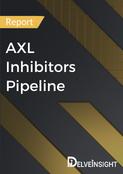AXL Kinase Inhibitor Pipeline
DelveInsight’s, “AXL Inhibitors - Pipeline Insight, 2026” report provides comprehensive insights about 16+ companies and 20+ pipeline drugs in AXL Inhibitors pipeline landscape. It covers the pipeline drug profiles, including clinical and nonclinical stage products. It also covers the therapeutics assessment by product type, stage, route of administration, and molecule type. It further highlights the inactive pipeline products in this space.
Geography Covered
- Global coverage
AXL Inhibitors: Understanding
AXL Inhibitors: Overview
AXL (anexelekto) is a Receptor Tyrosine Kinase (RTK) belonging to the TAM family. It is a cell-surface transmembrane receptor that exerts regulated kinase activity through its cytoplasmic domain. Other members of the TAM family are Mer and Tyro3. AXL is widely expressed in many organs, such as macrophages, endothelial cells, the heart, liver and skeletal muscle, where it plays a variety of roles, including clearing apoptotic material, regulating cell survival, maintaining vascular integrity, and hematopoiesis.
AXL kinase is a cell membrane receptor and an essential mediator of the biological mechanisms underlying life-threatening diseases. In malignant cells, AXL plays important roles in migration, invasion, cell cycle, and drug sensitivity. AXL therefore plays a role in cancer progression, and has been implicated in a wide variety of malignancies, from solid tumors to hematopoietic cancers, where it is often associated with a poor prognosis.
The kinase structure comprises an extracellular part with two immunoglobulin (Ig)-like domains responsible for ligand binding, a transmembrane region, and an intracellular domain. The growth arrest-specific 6 (Gas6) protein precursor and protein S are primarily responsible for kinase activation as their ligands. Both ligands share a similar domain composition.
AXL inhibitors have been shown to potentiate tumor cell apoptosis and suppress migration and invasion. Targeting AXL enhances the therapeutic efficacy of chemotherapy and other small-molecule inhibitors, such as VEGF, EGFR, PI3K, PARP, and HER2 inhibitors. AXL inhibitors, therefore, have potential high value at the centre of cancer combination therapy, addressing significant unmet medical needs and multiple high-value market opportunities.
“AXL Inhibitors - Pipeline Insight, 2026"" report by DelveInsight outlays comprehensive insights of present scenario and growth prospects across the mechanism of action. A detailed picture of the AXL Inhibitors pipeline landscape is provided which includes the disease overview and AXL Inhibitors treatment guidelines. The assessment part of the report embraces, in depth AXL Inhibitors commercial assessment and clinical assessment of the pipeline products under development. In the report, detailed description of the drug is given which includes mechanism of action of the drug, clinical studies, NDA approvals (if any), and product development activities comprising the technology, AXL Inhibitors collaborations, licensing, mergers and acquisition, funding, designations and other product related details.
Report Highlights
- The companies and academics are working to assess challenges and seek opportunities that could influence AXL Inhibitors R&D. The therapies under development are focused on novel approaches to treat/improve AXL Inhibitors.
AXL Inhibitors Emerging Drugs Chapters
This segment of the AXL Inhibitors report encloses its detailed analysis of various drugs in different stages of clinical development, including phase II, I, preclinical and Discovery. It also helps to understand clinical trial details, expressive pharmacological action, agreements and collaborations, and the latest news and press releases.
AXL Inhibitors Emerging Drugs
- Cabozantinib: Exelixis/Ipsen
Exelixis’ flagship compound, cabozantinib, is a targeted agent that inhibits the activity of receptor tyrosine kinases, including MET, AXL, VEGF receptors, and RET. These receptor tyrosine kinases are involved in both normal cellular function and in pathologic processes such as oncogenesis, metastasis, tumor angiogenesis, and resistance to multiple therapies, including immune checkpoint inhibitors (ICIs). Exelixis and its partners are collaborating on the global development plan for cabozantinib, and Ipsen and Takeda are responsible for the cabozantinib development work specific to their respective regions.
Cabozantinib is being developed by Exelixis/Ipsen and is currently in Phase III for Non-Small Cell Lung Cancer and Prostate Cancer.
- BA 3011: BioAtla
BA3011 (CAB-AXL-ADC) is a CAB antibody drug conjugate that targets the receptor tyrosine kinase AXL. AXL is an important target as they are expressed in many solid tumors with higher frequency of expression observed in tumors previously treated with anti-PD-1 therapy. This, coupled with the therapeutic index advantages provided by BioAtla's proprietary CAB technology, lends strong rationale for investigating BA3011 and BA3021 in combination with Opdivo. The drug is in the Phase II stage of development for the treatment of ovarian cancer and Non-Small-Cell Lung Cancer.
Further product details are provided in the report……..
AXL Inhibitors: Therapeutic Assessment
This segment of the report provides insights about the different AXL Inhibitors drugs segregated based on following parameters that define the scope of the report, such as:
Major Players in AXL Inhibitors
There are approx. 16+ key companies which are developing the therapies for AXL Inhibitors. The companies which have their AXL Inhibitors drug candidates in the most advanced stage, i.e. Phase III include, Exelixis and others.
Phases
DelveInsight’s report covers around 20+ products under different phases of clinical development like
- Late stage products (Phase III)
- Mid-stage products (Phase II)
- Early-stage product (Phase I) along with the details of
- Pre-clinical and Discovery stage candidates
- Discontinued & Inactive candidates
Route of Administration
AXL Inhibitors pipeline report provides the therapeutic assessment of the pipeline drugs by the Route of Administration. Products have been categorized under various ROAs such as
- Intra-articular
- Intraocular
- Intrathecal
- Intravenous
- Oral
- Parenteral
- Subcutaneous
- Topical
- Transdermal
Molecule Type
Products have been categorized under various Molecule types such as
- Oligonucleotide
- Peptide
- Small molecule
Product Type
Drugs have been categorized under various product types like Mono, Combination and Mono/Combination.
AXL Inhibitors: Pipeline Development Activities
The report provides insights into different therapeutic candidates in phase II, I, preclinical and discovery stage. It also analyses AXL Inhibitors therapeutic drugs key players involved in developing key drugs.
Pipeline Development Activities
The report covers the detailed information of collaborations, acquisition and merger, licensing along with a thorough therapeutic assessment of emerging AXL Inhibitors drugs.
AXL Inhibitors Report Insights
- AXL Inhibitors Pipeline Analysis
- Therapeutic Assessment
- Unmet Needs
- Impact of Drugs
AXL Inhibitors Report Assessment
- Pipeline Product Profiles
- Therapeutic Assessment
- Pipeline Assessment
- Inactive drugs assessment
- Unmet Needs
Key Questions
Current Treatment Scenario and Emerging Therapies:
- How many companies are developing AXL Inhibitors drugs?
- How many AXL Inhibitors drugs are developed by each company?
- How many emerging drugs are in mid-stage, and late-stage of development for the treatment of AXL Inhibitors?
- What are the key collaborations (Industry–Industry, Industry–Academia), Mergers and acquisitions, licensing activities related to the AXL Inhibitors therapeutics?
- What are the recent trends, drug types and novel technologies developed to overcome the limitation of existing therapies?
- What are the clinical studies going on for AXL Inhibitors and their status?
- What are the key designations that have been granted to the emerging drugs?


